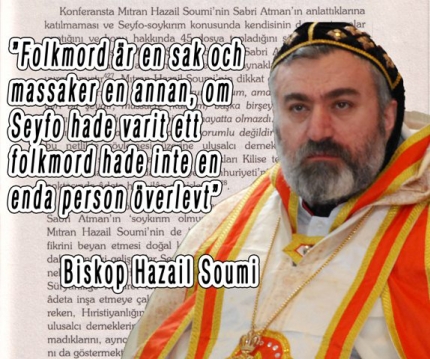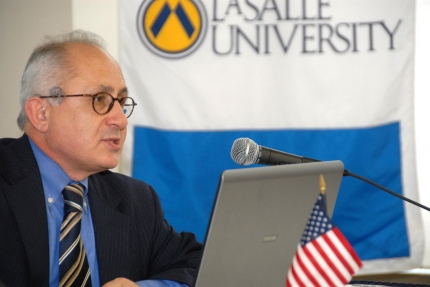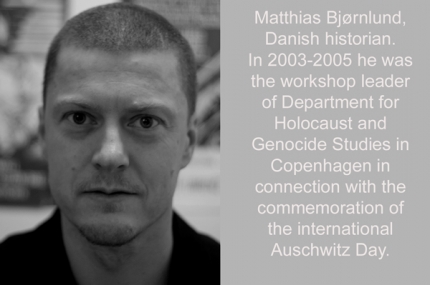Please share your opinion about Assyrians and the Assyrian Genocide.
If you mean what I think the status of these events should be, I do not research directly on the historical documents, but it seems clear from what is demonstrated in works such as David Gaunt’s Massacres, Resistance, and Protectors that there was an Assyrian Genocide that paralleled and often intertwined with the destruction of Armenians. While the specific experiences of the groups varied, the intent to exterminate these two significant Christian minorities (as well as substantial parts of the Pontian Greek population) can be seen as one overarching genocidal process in the Ottoman Empire.
The recognition of multiple victim groups in this case is crucial to understanding the true dynamics of each aspect of the genocidal process. While recently there has been more scholarship, some of it denialist, on the complexity of the “Muslims” in the Ottoman Empire, including refugees, in relation to the “events of 1915,” there has been little effort that I am aware of to develop a comprehensive theory of the genocidal process that takes full account of the multiple victim groups. For instance, my view is that the existence of genocidal labor battalions victimizing Greeks in the 1920s, beyond its primary importance regarding its victims, is hugely significant for understanding the genocidal elements persisting past the end of the Ottoman Empire.
What should be the first step to take for the Assyrians living in the U.S and how do you propose, we can raise more awareness about the Assyrian Genocide, at a global level?
Assyrians have already been taking many steps in recent years, including the development of the Seyfo Center. One help for Assyrians is that the Armenian Genocide aspect has been well-publicized in recent years, in the United States, Turkey , and elsewhere, which means that Assyrians do not need to educate “from the ground up,” as many people already have some understanding of the overall genocidal process in the Ottoman Empire during World War I. But this is also a hindrance, because these events have been so associated with Armenians that many people outside of the Armenian, Assyrian, and Greek communities do not know much if anything about the Assyrian experience of genocide. The responsibility for this is partly that of those Armenians who do not make enough of an effort to include Assyrians in the genocide discussion as well as those outside these communities who have not studied the issue adequately and stay with a relatively simple understanding of it, in the sense of not recognizing multiple victim groups. Interestingly, today’s Turkey is probably most responsible for this double-denial. Not only does the government and its supporters in academia and beyond deny any genocide in this period, but they specifically focus on “Armenian allegations,” thereby denying that they are even denying the Assyrian Genocide. Assyrians are not even recognized as those whose claims are being rejected, except in response to specific initiatives by Assyrians. Part of this is a geopolitical issue, given the relative size and political influence of the two victim groups, but part of it is also probably due to the notion that if the Armenian Genocide is successfully denied, the Assyrian case will fail as well.
In any event, it should not be Assyrians who should have to be doing all of the work to raise awareness. The broader world community owes it to victim groups to take on the burden of education about what the victims have suffered. But, even if it is unfair that Assyrians have to work hard to gain basic recognition of their people’s suffering, this is also the situation of Armenians and most other victim groups. Practical steps that Assyrians could take would be applying for panels at International Association of Genocide Scholars’ conferences and other conferences on genocide, Middle East history, and so forth. Disseminating the existing research is very important. Another way to promote awareness would be supporting more scholarly research on the issue. Of course, this is a great struggle for Armenian and other victim groups, so it will not be easy, but it is important to go beyond advocacy, to provide insightful and extensive scholarship that becomes part of the growing literature in comparative genocide studies. Showing how the Assyrian case contains elements that will help us understand genocide generally can be very helpful as part of presenting research to scholars and the public at large.
How can the past Genocide affect our future and why is it important not to forget the past Genocide?
The Assyrian Genocide, like the Armenian case, had a dramatic impact on Assyrians in every possible way. However much Assyrians have overcome the effects of genocide, it still has direct material, political, and psychological impacts – these impacts were, after all, exactly why the Young Turks pursued genocide in the first place. And, the great effort required to address these effects demonstrates how significant they are. I do not mean to suggest Assyrians are perpetual victims, but it is crucial to recognize the concrete ways genocides impact victim groups. This is both why this genocide must be remembered and how it affects the future. Unless these harms are addressed in the future, through symbolic and material reparations, the impact will remain.
In your opinion, what is the reason for Turkey’s denial about the Assyrian, Armenian, and Greek Genocide?
As I have discussed in publications, the reasons are three-fold. First, there is the desire to escape from responsibility. The Young Turks placed a horrible burden on contemporary Turks to deal with the legacy of genocide, and most contemporary Turks actively avoid shouldering this burden. This is not unique to Turkey. Think of how people in the United States avoid the obvious responsibility rampant genocide of Native Americans puts on us.
Second, contemporary Turkish national identity might be seen in part as a resentful response to the loss of empire, which allows contemporary Turks to continue to view themselves as imperial superiors to at least some other groups, especially former subject peoples such as Assyrians, Greeks, and Armenians. Part of this identity depends on a frail, even desperate clinging to elements of the Turkish past that demonstrates dominance. Identifying with the Young Turks is one element of this. To expose the Young Turks for what they were undermines Turkish national identity, which is a key determinant in many personal identities. This is again similar to the United States, where criticism of US military aggression, say, is taken as a personal assault by some people in the United States and met with belligerence. In all of this, the facts have little role – everything is about a complex intermingling of psychological and political forces.
Finally, the threat of reparations, that is, some kind of return of lands and other wealth and/or compensation for it, looms very large. Ultimately, I believe this is the central issue. Turkish elites understand full well today the public and personal material benefits they enjoy from these genocides and they appear unable to entertain even the notion of giving up even some of them. The majority of Turks generally cannot accept, for instance, return of lands from inside their state’s borders.
Do you think Turkey will ever recognize the Genocide it has committed during the Ottoman Empire against the Christian minorities namely Assyrians, Armenians, and Greeks?
I am not sure about this. As a colleague of mine, Armenian Genocide scholar Dikran Kaligian, says, if the Turkish Republic ever gets a guarantee that there will be no reparations to follow recognition, they will recognize the Armenian Genocide in a second. I think his point – reparation is the key fear – is, overall, correct, but I think that the sense of national identity is also very strong and cannot accept recognition. I suspect if there were some sort of recognition, within a few years there would be a backlash against it and an ensuing oscillation between partial recognition and partial denial – something like what has happened in Japan regarding such things as the Nanjing Massacre, if my reading of scholars such as Takashi Yoshida is correct. Thus, the issue is not really about simple recognition by Turkey , but lasting change in attitudes among Turkish elites and people generally, inside and outside of Turkey . One grand statement of recognition is not meaningful if it can be retracted or eroded later.
There has been so many documents and reports and books published on the Assyrians Genocide that happened in 1915, why do you think that the United States administrations has not yet recognized the Genocide?
The literature on the Assyrian Genocide is not widely known yet, and perhaps the suggestions in answer to Question 2 above could help. But this is not the fundamental reason. To the extent Assyrians and their supporters push for recognition, the Turkish government and its supporters will do as they do regarding the Armenian case – deny and put military, economic, and political pressure on the US government not to recognize the genocide. What is more, to recognize the Assyrian case would entail recognition of the Armenian case, so with all the pressure not to do the latter at this point, the former is blocked as well. The reverse is not true: it would be possible to recognize the Armenian Genocide without recognizing the Assyrian case, putting the Assyrians in something like the position of the Gypsies. But, I would hope that advocates for Armenian Genocide recognition would not accept this outcome and push hard for recognition of the Assyrian Genocide as well. A hopeful sign of the linking of the two cases as well as the Pontian Greek case is the 2007 resolution by the International Association of Genocide Scholars on “Genocides against Assyrians, Greeks, Armenians, and Other Christians by the Ottoman Empire,” which specifically recognized the Assyrian and Pontian Greek cases as genocide.
Can you please explain the similarities between Holocaust and Seyfo?
I mentioned in my previous response the Gypsies, and I think that this is the key comparative point with the Holocaust, if we take the Holocaust in its broad sense, as not only the Nazi Genocide of the Jews. The Assyrians were in a similar position as the Gypsies, as a smaller group that was targeted within the overarching genocidal ideology of the case in question. One interesting point to consider is the extent to which a specific Young Turk anti-Assyrian ideology existed alongside the anti-Armenian ideology. In the case of the Gypsies, partly because of the long history of their persecution, there was a distinct anti-Gypsy element of Nazi ideology. An important future research topic might be what was the relationship of the more general anti-Christian-minority ideology to specifically anti-Assyrian elements? Whatever the answers generated, this will advance understanding of the similarities of and differences between the Holocaust and the Seyfo.
At the same time, for two reasons I would caution against too much of a focus on this issue. First, while the reason for comparison is presumably that the model of the Holocaust is very well-known in the world and comparing the Seyfo to it would help people understand the Seyfo better, comparisons to the Holocaust might be construed as a victim group using the Holocaust to advance its own agenda. Second, the Holocaust was a particular genocide, with particular features. While it was continental in scope and represents one of the broadest and most intensive genocidal campaigns in history, with deep historical roots, there are central features of various genocides that do not appear in the Holocaust. Focusing too much on similarities to the Holocaust might mean losing sight of these important, distinctive features of the Assyrian case.
By Linda Abraham, Seyfo Center




